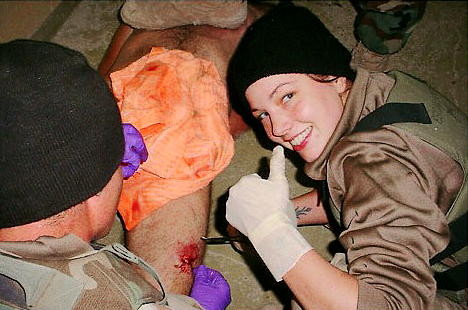The musics of war ...

Phil Metres, Abu Ghraib Arias (FGP, 2011), unpaginated—On alternating verso (American soldiers) and recto (Iraqi prisoners of war) pages of this chapbook, Metres ventriloquizes the voices (though some of this work is drawn from published texts) of the culprits and victims of our most recent military adventures. Interspersed with the “confessions” and “blues” of the American soldiers (including Lyndie England) are several “Standard Operating Procedures” texts regarding the “handling” of Muslim bodies, the Koran and military documents. Like some of the soldiers’ testimonies, parts of these texts are blacked out, replicating the redaction of classified documents. The recto testimonies of the Iraqis are perhaps the most compelling texts here. Titled “(echo/ex),” each text is smaller in size than its predecessor (the first is a full-page, margin to margin, “oath,” a swearing in to testify to the “truth”). By the time we reach the last “(echo/ex)” words have vanished altogether; only quotation marks, brackets, periods, commas, etc. remain. In brief, Metres’ project is a microcosmic version and amalgamation in the mode of M. NourbeSe Philip’s Zong and Rob Halpern’s recent, largely unpublished, working through of declassified Guantanamo documents. Of course, the particular documentary impulse—straightforward testimonials—driving this chapbook can be traced back to some of Mark Nowak’s work (I’m especially fond of Coal Mine Elementary) and, even farther back, to Charles Reznikoff’s Testimony and Muriel Rukeyser’s The Book of the Dead. Yet, like all documentary poetics haunted by the Duncan-Levertov dispute regarding “how” to evoke the essential elements of the Vietnam conflict, Abu Ghraib Arias cannot escape the shadow of its ancestry. To the extent Metres sides with Levertov, the last pages of the chapbook notwithstanding, Abu Ghraib Arias is an important contribution to the debate and a minor adjunct (it is a chapbook, not a tome) to the legacy traced by its epical predecessors.
Hunches, hedges, etc.